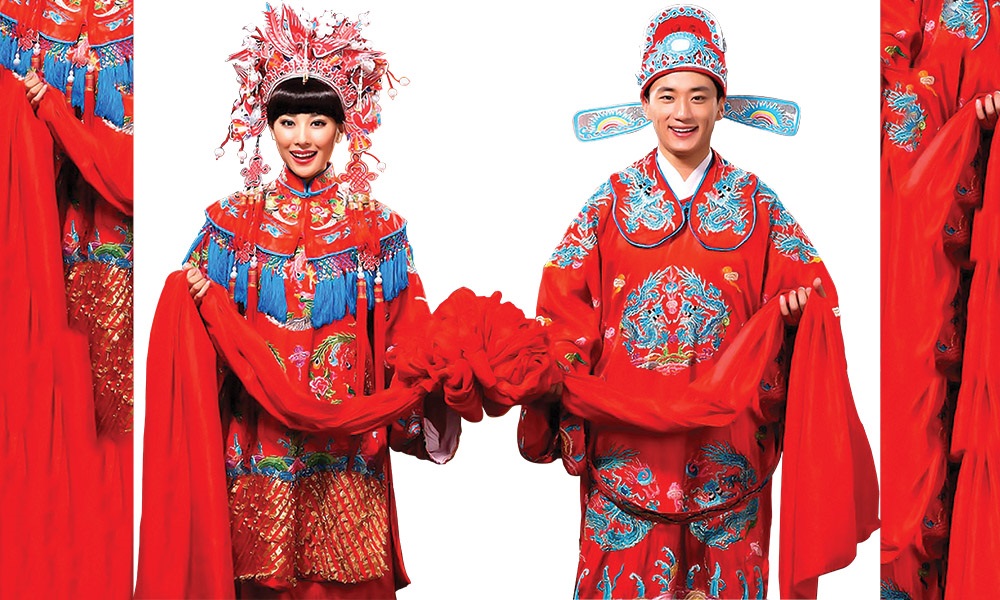By Jade Pearce |
When I first met my husband – a Canadian – eight years ago, we had never been in a relationship before (nor were we looking for one). But serendipity brought him 13,000 kilometres across the Pacific Ocean to a small tropical island that he had never set foot on before, and fate landed us in the same workplace as interns.
Eight years later, we are happily married and living in another country. Every now and then, we wonder at the fortuitous arrangement that brought two people from very different backgrounds together.
And I can see why the ancient Chinese believed marriage arises from a predestined relationship arranged by Heaven. According to traditional belief, the married couple have forged a kinship over countless lifetimes, and this predestined relationship brings them together in this lifetime.
It neatly explains the strange forces that bring two strangers together in a sacred, lifetime union, among the billions of people in this world.
The Old Matchmaker Under the Moon
In Chinese mythology, the god of marriage and love is Yue Lao, or the “Old Man Under the Moon”. A divine matchmaker, Yue Lao (月老) pairs up couples long before they have met, as encapsulated in this story.
During the Tang dynasty, there was a man named Wei Gu (韦固) who very much wanted to marry and have a family of his own.
While touring Qinghe County one year, Wei Gu met a matchmaker who offered to pair him with the daughter of a top official. Wei agreed, and he was told to meet the family at Longxin Temple the next day.
The next morning, Wei rushed eagerly to the temple, arriving so early that it was still dark. In the moonlight, he spied an old man reading a book by the temple steps. Wei glanced curiously at the pages, but found that he couldn’t read the words.
“Sir, what kind of book is this? Why can’t I recognise the words?” Wei asked.
The old man laughed. “That’s because this book is from the netherworld and not for mortal eyes.”
“But why would a being from the netherworld be here?” Wei asked.
“I am the god in charge of arranging marriages, and I am here to arrange one,” the old man explained.
Wei Gu was delighted. “I’ve tried so hard to find a wife, but I’ve never been successful. Today, I am meeting the daughter of an official. Will I be successful this time?”
“No. Your future wife is only three years old now. She will have to be 17 before she becomes your wife,” replied the old man.
Wei Gu asked to see his future wife, and the old man brought him to the vegetable market, where Wei saw an old lady carrying a young girl. The old lady was blind in one eye, and the girl looked very dirty and ugly. The old man pointed at the girl and said, “That’s your future wife.”
Wei couldn’t believe that he would marry this ugly child. He said angrily, “I want to kill her!”
“This girl is destined to be blessed with wealth and fortune, and she will share it with you. How can you kill her?” The old man exclaimed.
The old man then pointed to his bag. “This bag is full of red string. When two people are destined to marry, I bind their fate by tying a red string around their ankles. Once the string is tied, they cannot escape.
“I have already tied your ankle to your future wife’s. Even if you try to find another wife, your efforts will be futile.” With that, the old man disappeared.
A red string brings together two people destined to marry each other, even when they are thousands of miles apart. – Chinese saying –
A seething Wei went home and sharpened a knife, which he gave to his servant. “If you kill that girl, I will reward you with 10,000 yuan,” he said. The servant went to the market, and in the hubbub he stabbed the girl on the forehead. Chaos broke out, and the servant ran away.
For the next 14 years, Wei remained just as unsuccessful in his love life. He eventually joined the army and served under Governer Wang Tai, who was impressed by Wei’s work.
Governor Wang decided to betroth his beautiful 17-year-old daughter to Wei. Wei was delighted, but soon noticed that his new wife always had a small flower paper pasted to her forehead.
When Wei asked his wife about the paper flower, she began to cry. “I am actually the niece of Governor Wang, who adopted me six years ago. My father, a county magistrate, passed away while on service, and my mother died soon after. I was raised by my nanny, Mrs Chen. From a young age, I would accompany Mrs Chen to the market where she sold vegetables.
In Chinese mythology, the god of marriage and love is Yue Lao, or the ‘Old Man Under the
Moon’.

“But when I was three, a savage person stabbed me between the brows, leaving a scar that I’ve been covering with a paper flower.”
Wei asked, “Was Mrs Chen blind in one eye?”
“Yes she was! How did you know?” his wife exclaimed.
“I was the savage who sent that man to stab you,” Wei confessed. He then explained everything that had happened at Qinghe 14 years ago.
Thereafter, Wei and his wife treated each other with deference and respect. His wife was named the Lady of Taiyuan County, and they had a son who also became a high-ranking official.
The story of Yue Lao gave rise to the Chinese expression, “A red string brings together two people destined to marry each other, even when they are thousands of miles apart.” In many traditional cultures, it is believed that marriages are predestined arrangements by the gods.
Negativists may say that this means we have no choice in whom we marry. But the ancients saw it as a divine arrangement that should be accepted and upheld. This meant being faithful to one’s partner, treating them with respect, and embracing their quirks.
It also meant showing gratitude for one’s partner, as the next story illustrates.
Treating Each Other With Respect and Gratitude
In traditional Chinese culture, mutual respect and gratitude are important cornerstones of a stable and virtuous marriage. Couples were encouraged to “treat each other with the respect due to a guest” (相敬如宾).
There are many ancient role models of respect and gratitude between husband and wife. One such couple were the Han Dynasty official Liang Hong and his wife.
When Liang’s wife brought him his meal, she would raise the tray high up to her brows and bow respectfully, asking him to have his meal.
Liang would reciprocate by bowing deeply and thanking her for the meal.
Their story gave rise to the Chinese expression “raising the tray to one’s brows”, to describe the deep respect that a couple have for each other.
Another famous example is Xi Que and his wife from the Spring and Autumn Period. According to legend, an official from the Jin State was passing by a village, where he saw Xi Que (却缺) plowing a field.
Xi Que’s wife was waiting patiently beside the field with his lunch, and when Xi Que hurried over she respectfully bowed and handed the bowl to him. Xi Que bowed and accepted the bowl with both hands.
Deeply impressed by this display of mutual respect and gratitude, the official brought Xi Que to Duke Wen of Jin’s attention. Xi Que was promoted and had a successful career in government, while his village was renamed “Like Guests Village” (如宾乡), to commemorate the deep respect he and his wife displayed.
Marriage is one of the most monumental events in one’s life. But many marriages today are plagued by domestic abuse, cold wars, seven-year itches, and extramarital affairs.
These problems often arise when either partner loses sight of respect and gratitude. Marriage requires more than mutual infatuation — it also requires respect and gratitude for each other, and selflessness on both sides. These traits form the foundation of a stable and lasting marriage.

Faithfulness: Magistrate Marries Blind Fiancée
If I go against my promise, I’d be the one with the corrupt heart! I have to be faithful to her. Liu Tingshi (刘庭式), when told to call off his betrothal to his blind fiancée
A stable marriage is also built on faithfulness and trust. In fact, faithfulness is an indispensable part of marriage vows in every culture — “for better or worse, for richer or poorer, in sickness and in health … till death do us part”.
There is a moving story about faithfulness from the Northern Song Dynasty, and it begins with a scholar named Liu Tingshi. Liu was from a small village and, prior to his imperial examinations, was betrothed to a village girl from his hometown. However, the betrothal had not been formalised, as Liu had yet to pay the dowry.
Liu eventually passed the imperial examinations and was given the title of jinshi (“advanced scholar”). He was made a magistrate of Mi Province, and was deeply admired by the literary giant Su Dongpo, who was provincial governor at the time.
But Liu’s happiness was marred by the news that his fiancée had become blind from an illness. As her parents were poor farmers and well below Liu in social status, they did not dare bring up the betrothal to Liu, believing that he deserved better.
Liu’s friends also persuaded him to forsake the betrothal for his career. “Even if you must fulfil your promise to the family, you should marry the girl’s sister instead,” they said.
But Liu replied, “Since the day I agreed to marry her, I have already given her my heart. Although she has lost her sight, her heart is still as virtuous as ever. If I go against my promise, I’d be the one with the corrupt heart! I have to be faithful to her.”
So Liu married his fiancée and spent the rest of his life caring for her. They had a few children and led peaceful lives. The Chinese literati Su Dongpo was so moved by Liu’s loyalty that he wrote a poem about his story.
Despite having the opportunity to back out of a betrothal, Liu chose to fulfil his promise and remain loyal to his fiancée. His decision led to a lasting and virtuous marriage that was remembered for many generations.
Stories adapted from Minghui.org
















